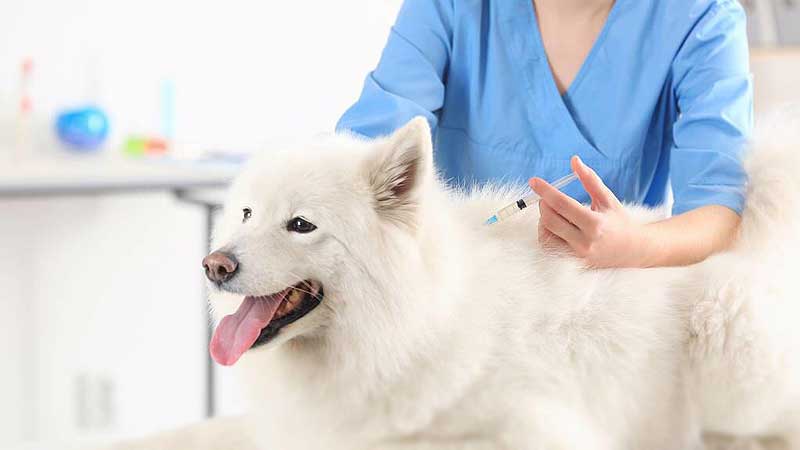- Size
- Smallest
- Small
- Small to Medium
- Medium
- Large
- Giant
- Characteristics
- Smartest
- Hypoallergenic
- Fluffy
- Best Guard
- Best Family
- Best for Kids
- Low Shedding
- Healthiest
- Police Dogs
- Most Calm
- Quietest
- Color
- White
- Black
- Grey
- Brown
- Blue
- Red
- Coat
- Hairless
- Short
- Long
- Origin
- Japan
- China
- Australia
- Germany
- Italy
- United States
- France
- Group
- Hound
- Terrier
- Herding
- Toy
- Working
- Sporting
Vaccines for Dogs: Here's Everything You Need to Know About It

Having a pet demands that you pay a lot of care and attention and dogs are no exception. Once your new family member is home and you proceed to shower it with love and affection does it strike you in the back of your mind regarding how helpless and incredibly dependant your puppy is on you to look after it.
It’s only natural to understand that you desire to raise your buddy in the best possible way and create a mutually fulfilling bond. Vaccines are an absolute must and it can be a bit overwhelming for new owners to accurately determine and recall the exact shots which are needed as and when required.
This list will attempt to explain the importance of each vaccine as well as provide you with an idea regarding the vaccination schedule.
Which Vaccines Are Needed?
Vaccines can be broadly classified into core and non-core vaccines.
Core vaccines are a must irrespective of which state you reside in and consist of vaccines your puppy will probably need in the first year. Core vaccines should be administered irrespective of the breed or geographical location.
There are 2 core vaccines:
1. DAP – Distemper, Adenovirus (Hepatitis) and Parvovirus
2. Rabies
DAP/DAPP/DHPP
DAP is the first core vaccine that needs to be administered at 6 to 8 weeks of age. Subsequent doses are required at 10-12 weeks, 16-28 weeks and 12-16 months. This is to be followed by a dose every one or two years - making it the most frequent and important vaccine in your puppy’s early phase of growth and providing immunity against the contagious diseases mentioned above.
DAP provides immunity against 3 major infectious diseases:
Distemper – This viral disease spreads from coughing and sneezing in unvaccinated dogs and affects the respiratory, gastrointestinal and more importantly the nervous system. It can also spread via sharing of feeding and water bowls. There is no apparent cure for the disease and only symptomatic management is possible. It may cause lifelong nervous system disabilities and has a higher fatality rate among puppies.
Adenovirus – Responsible for causing Canine Hepatitis which mainly affect the liver, lungs and kidneys. Similar to Canine Distemper, there is no cure and treatment is predominantly symptomatic.
Parvovirus – Parvo infections are rare but highly infectious as the virus is very difficult to eliminate. Mostly spreads from contact with contaminated surfaces. Causes dehydration due to severe vomiting and diarrhoea.
Alternatively, the DAPP vaccine can be administered and is basically DAP with additional immunity against Parainfluenza which is a causative agent of canine Distemper (discussed below).
Rabies
Perhaps the most infamous disease commonly associated with dogs, the Rabies shot is to no one’s surprise, a core vaccine. Rabies is a disease affecting the central nervous system causing encephalitis – Initial phases have non-specific symptoms such as fever, vomiting and lethargy. The clinical phase of the disease has symptoms like aggression, lethargy, drooling, seizures and paralysis at which point it becomes largely fatal.
Rabies can be fairly life-threatening if ignored and also puts humans in contact with a rabid dog at risk as well. Fortunately, rabies is largely preventable via timed vaccination and is a major reason why different states have their separate vaccination criterion for rabies. The default recommended time for the first dose is at 14-16 weeks but certain states may demand an earlier vaccination.
The second dose is scheduled at 12-16 months following which a single dose is required every 1-3 years depending on how active your pet is outdoors. Naturally, more adventurous pups are best vaccinated annually.
Non-core vaccines: These are optional vaccines administered in case your vet determines it is necessary. The factors in favour of vaccination are:
● Location – Certain diseases are more prevalent than others in a particular region
● Level of outdoor activity – The more sporting the breed, the more exposure to the wild elements and contaminated water during hiking and other outdoor activities.
● Prolonged periods spent at puppy daycare can increase the risk of infection to contagious diseases
● Poor health, weak build in general.
The Non-Core Vaccines Are As Following:
1. Bordetella and Parainfluenza – They are the primary causative agent of what is more commonly referred to as Kennel Cough – a highly infectious respiratory disease that spreads via droplets in places where a large number of dogs are present in a confined space such as a Day care/Training groups/Dog parks or a Dog show. If you plan to frequently take your pet to such places it is better to get vaccinated against the same.
Kennel cough has symptoms such as a distinctive forceful yet persistent cough, low fever, sneezing and a runny nose.
The first dose should be administered at 6-8 weeks followed by a dose every six months or annually as determined by your vet.
2. Leptospirosis – A bacterial disease that spreads from contact with urine from an infected animal. This may be considered a core vaccine in regions where Leptospirosis is prevalent. The disease can spread from dogs to humans and affects the liver and kidneys.
The first dose should be administered at 10-12 weeks followed by the second dose at 14-16 weeks. Like Bordetella subsequent doses can be spaced biannually or annually as seen fit by your vet. This regimen is to be followed for both Lyme disease and Canine Influenza as well.
3. Lyme disease – Another bacterial disease mostly restricted to endemic regions. Travelling to the same may require vaccination.
4. Canine Influenza – Symptoms are similar to the flu in humans although the viral strain responsible is different.
Other non-core vaccines are available for Coronavirus and heartworm.
While costs vary across regions, on average, the DHP vaccine may cost anywhere from $25 to $50 per dose while Rabies shots cost around $20 per dose. Cost of Non-core vaccines ranges from $20 to $50 per shot. As far as booster doses are concerned, it is best to consult your vet instead of getting your dog vaccinated annually.
It’s possible for your pet to develop mild fever or lethargy post vaccination but do keep an eye out for more severe reactions such as allergies or breathlessness. Contact your vet accordingly.
References
- [1] ^ WebMD: Pet Vaccines: Schedules for Cats and Dogs





